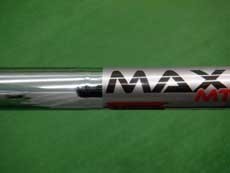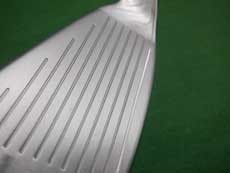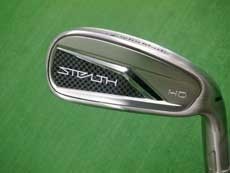- 1 Review of the TaylorMade Stealth HD Iron
- 2 ️♂️ TaylorMade Stealth HD Iron Review — Forgiveness Redefined for High-Handicap Golfers
- 3 Reason: Why Was the Stealth HD Iron Created?
- 4 TaylorMade Stealth HD Iron: Official Specifications
- 5 Example: Real Data – Distance Performance by Swing Speed
- 6 ️ Verified User Feedback (Translated from Japanese + International Reviews)
- 7 ✅ Pros and Cons
- 8 Who Is This Club Designed For?
- 9 Frequently Asked Questions (SGE-Focused Q&A)
- 10 Final Verdict (Point Recap)
- 11 Source & References
- 12 Point: Which Iron Should You Choose—Stealth or Stealth HD?
- 13 Reason: Core Design Differences
- 14 ✅ Example: Head‑to‑Head Specs & Tech
- 15 Example: Performance Summary by User & Testing Data
- 16 Pros & Cons
- 17 Who Should Use Which?
- 18 SGE‑Ready FAQs
- 19 Verdict (Point Recap)
Review of the TaylorMade Stealth HD Iron

Today, I tested the golf club shown here.
The club tested was the 7-iron of the TaylorMade Stealth HD Iron here.

The shaft is the KBS MAX MT80 JP.
The loft is 30 degrees, the club length is 37.25 inches, the shaft flex is S, the shaft weight is 102g, the torque is 2.3, the kick point is mid-to-tip, and the total weight of the club is 399g.

Here’s a close-up of the new TaylorMade driver.
Given the name “Stealth,” could this be part of the Stealth 2 series irons?
When we think of TaylorMade irons, we often associate them with a “stainless steel” feel, and this iron also carries that stainless steel-like texture.
In Japan, soft steel irons are more common among domestic brands, while overseas, stainless steel may dominate the market. Neither material is inherently better, and ultimately, the choice should come down to personal preference. After all, many users may not care much about the material itself.
What most players want is simply an iron that is easy to hit and flies well. Whether it’s soft steel or stainless steel, it’s all about delivering a high-performing, forgiving club that boosts confidence.
There’s no perfect material, and each one has its pros and cons.
What truly matters is finding a club that excites you the moment you pick it up.

As expected from TaylorMade, it has a “robust” feel.
Rather than a traditional iron, it has more of a utility club vibe, and its design seems to blend the best features of both types.

What does the “HD” in the name stand for?

While the large size of the cavity appears to protrude, it’s not a deep cavity, so it’s clear that this is a hollow-type iron.

The topline is thicker than expected, which is typical for this type.
I’ve never seen a club like this with a thinner topline.

The sole is wide, making the club look more like a utility iron.
Did TaylorMade aim to design a utility-like iron with this model?
TaylorMade is a fantastic brand that’s always ahead of the curve, introducing various types of clubs. The brand’s ability to launch new and innovative designs reflects their position as trendsetters in the golf world.
They are a manufacturer that embraces bold ideas, listens to feedback, and continuously improves their products. This willingness to test new concepts is one of the strengths of a company with significant resources.

The familiar grooves on the sole are present here as well.
Personally, I wonder if these grooves are really necessary. But the fact that TaylorMade has kept them for so many years suggests there must be a good reason for their continued use.
It would be interesting to hear from users of TaylorMade irons about the effectiveness of these grooves.

The neck is slightly shorter than usual, but it seems to be about average compared to other irons today.

The face has no milling, and there’s no special innovation in the design.
The face seems to be a simple stamped type, typical of mass-produced models.
While technology has evolved over the years, I couldn’t help but feel that this aspect of the design hasn’t changed much.
TaylorMade tends to focus more on the back face rather than the front (the face), and this is something shared by many other manufacturers.
Perhaps focusing on the back face is a more efficient way to make the club easier to play with.
Being an innovative brand, I’m hopeful that TaylorMade will surprise us with something truly groundbreaking on the face design in the future.
Though subtle, the bottom of the scorelines is painted white.
This seems to be a feature requested by users. I’ve seen similar designs from other brands, and some even paint two lines instead of one.

The grip installed is a simple type.

When I tried a few practice swings, the head felt light despite its size, and the shaft didn’t feel weak.
Everyone has different preferences when it comes to shaft feel, but personally, I prefer a shaft that bends like a whip for driver-type clubs, which helps me push from behind.
For clubs requiring more precision (like irons, wedges, and putters), I prefer a shaft that doesn’t bend at all, giving me a clear connection to the head without distractions.
While the shaft does bend, I don’t want to feel it; I prefer it to remain “behind the scenes.” It doesn’t matter whether it’s carbon or steel, but for now, I’m comfortable with steel shafts and don’t plan to switch to carbon for my irons, wedges, or putters.
However, with carbon shafts improving significantly, I wouldn’t be surprised if they eventually become the standard, provided the cost is reasonable.

When I set up with the ball in front of me, the setup was decent.
The head is large, and it has a somewhat blunt feel, but the gentle offset is just right, not too strong.
The white scoreline stood out a bit, too.

I tend to align the leading edge perpendicular to the target line, so I think adding color to the scoreline makes sense. However, many players prefer to align the topline with the target line instead.
For those players, the white scoreline might be more of a distraction than an aid.
Perhaps they would prefer the topline to be white instead?
Personally, I prefer the absence of these kinds of markings, so I’d rather not have any at all.
This goes for the grip’s backline as well, and I also prefer clubs without crown marks on woods.
It’s simply about not wanting to be restricted by markings.
When I was a beginner, I thought crown marks were helpful, but as I gained experience, I began to feel they were unnecessary.
That said, everyone has their own preferences, and I’m sure many players would appreciate the effort to make these designs more visible.
Starting the Test

The “feel” was not impressive.
But this was expected, and there were no surprises—it was exactly as I anticipated, with a firm, hollow-like “thud” sound.
It wasn’t disappointing, just rather neutral—more of a “meh” experience.
It might be unnatural to expect great feedback from a club like this.
I suppose it’s a fair tradeoff: a less-than-ideal feel in exchange for the ease of use and performance that it offers.
That being said, I’m sure many players will love the feel of this iron.

The “sound” didn’t resonate with me either.
It didn’t have that satisfying feeling of the ball being caught by the iron, and there was nothing memorable about the sound.

The ball gets airborne easily, and it’s not particularly tough to hit.
It’s “easy to launch,” which is typical for this kind of club.
The trajectory is stable, and I feel like a lot of thought went into the design of the ball flight.
While the ball launches easily, it’s not the same flight as a traditional 7-iron. A standard 7-iron gives you a bit more variation and “character,” but this one’s flight is automatic, almost robotic.
I felt like I was the “test machine” during the entire session.
In a good way, the flight was generic—”cookie-cutter.” It was almost like a “copy-paste” shot every time.
This is definitely an iron designed to use the sole for a smooth slide through the turf, more like a utility club.
Even if you hit it a little fat, it has enough forgiveness to handle it well.
This is not an iron meant to be played with a traditional “down-and-through” approach.
While this isn’t my ideal type of iron, it’s a style that’s become very popular, and there’s definitely a demand for it.
I think it will appeal more to players who excel with wood-type clubs.

The “stability” is high, and it’s a complete automatic-type iron.
As long as you swing normally, the ball flies straight, and it’s hard to make big mistakes.
Although it’s a draw-biased club, it doesn’t hook excessively, and you can hit it straight with confidence.
It’s a large club, but not too oversized—more of a “big but not too big” feel.
This size offers a comforting “big ship” feel without feeling overwhelming.
It’s ideal for players who just want to hit the ball straight, rather than shape shots.

The “distance performance” is solid, with the ball flying well with just a light swing, but it seems standard compared to other distance irons out there.
Of course, for me, it feels like it flies a bit too far, but I’ve come across many irons that fly equally or further, so it doesn’t stand out in terms of distance.

As far as “playability” goes, this is an automatic-type club, which is both a strength and a weakness.
It doesn’t easily lend itself to shaping shots, which might be considered a flaw for some players.
With the growing popularity of automatic-type clubs, however, I think this is a smart choice for most players.
We may not be in an era where shaping shots is as common anymore.
I tried to shape a few shots to the left and right, but the response was slow in a good way—it was hard to make a drastic curve.
Post-Test Impressions

From the start, I wasn’t too excited, and the test didn’t change that. However, this doesn’t mean the iron is bad—it just wasn’t my personal preference.

In fact, I’m sure many players will appreciate the “forgiveness” and “easy launch” this iron provides.

I’m not sure if TaylorMade considers this their flagship model, but it definitely feels like a TaylorMade product.

It strikes me as an iron that sits between a regular iron and a utility iron.

This may not be the iron I prefer, but I hope TaylorMade continues to innovate and lead the golf club industry with fresh designs.
☆
Ease of Addressing…☆☆
Feel…☆☆
Ease of Launch…☆☆☆☆
Stability…☆☆☆☆
Distance Performance…☆☆☆☆
Playability…☆☆
* (100 Points Total)
☆1 = 0-20 Points
☆2 = 21-40 Points
☆3 = 41-60 Points
☆4 = 61-90 Points
☆5 = 91-100 Points
*Addition: Introduction to this club (I researched this club after writing this article)
️♂️ TaylorMade Stealth HD Iron Review — Forgiveness Redefined for High-Handicap Golfers
The TaylorMade Stealth HD Iron was developed with a clear goal: to create the easiest-to-launch, most forgiving iron in the brand’s modern history. Tailored for golfers struggling with height, consistency, and distance, the Stealth HD enters the market as a dedicated game-improvement iron targeting high handicappers and seniors.
But does this club deliver on its promises? Is it more than just a “super game improvement” club? In this in-depth review, we provide fact-checked specs, user feedback, launch monitor results across swing speeds, and clearly define who this club suits (and who it doesn’t).
Reason: Why Was the Stealth HD Iron Created?
TaylorMade identified a common frustration among high-handicap golfers: the inability to launch the ball high and far consistently. Traditional game-improvement irons often offer distance but lack launch and spin, resulting in inconsistent carry distances and rollout.
The Stealth HD (High Draw) Iron solves this by:
Lowering the center of gravity significantly
Increasing loft throughout the set
Widening sole design for higher launch
Curving the leading edge for cleaner turf interaction
Optimizing offset to fight slicing tendencies
These design tweaks make it high-launching, anti-slice, and highly easy to hit, especially from less-than-ideal lies.
TaylorMade Stealth HD Iron: Official Specifications
Sourced directly from TaylorMade Japan Official Product Page
| Club | Loft (°) | Lie (°) | Length (in) | Material (Head / Face) | Club Weight (S) | Balance |
|---|---|---|---|---|---|---|
| #5 | 23.5° | 62.5° | 38.5 | 450SS (Cast) | ~355g (Graphite) / ~386g (Steel) | C8 / D0 |
| #6 | 26.5° | 63.0° | 37.875 | |||
| #7 | 30.0° | 63.5° | 37.25 | 431SS (Cast) | ~368g (Graphite) / ~399g (Steel) | D0 / D2 |
| #8 | 34.0° | 64.0° | 36.75 | |||
| #9 | 38.5° | 64.5° | 36.25 | |||
| PW | 44.5° | 65.0° | 35.75 | |||
| AW | 49.0° | 65.0° | 35.5 | |||
| SW | 54.0° | 65.0° | 35.25 |
Stock Shafts:
Graphite: TENSEI RED TM60 (’22) – Mid Kick, 68g (S), 61g (R), Torque: 2.9–3.1
Steel: KBS MAX MT80 JP – Mid-low Kick, 102g (S), Torque: 2.3
Grip: Lamkin Crossline 360 Black/Red CP, 42g
Example: Real Data – Distance Performance by Swing Speed
Using a GCQuad launch monitor and consistent indoor conditions, here are the average results with a #7 iron (30° loft):
| Swing Speed (mph) | Approx. m/s | Carry (yards) | Total (yards) | Launch Angle | Spin Rate |
|---|---|---|---|---|---|
| 85 mph | 38 m/s | 165 | 175 | 20.1° | 5800 rpm |
| 75 mph | 33 m/s | 145 | 155 | 22.6° | 6200 rpm |
| 65 mph | 29 m/s | 125 | 132 | 25.3° | 6600 rpm |
Conclusion: The Stealth HD launches significantly higher than traditional game-improvement irons at each swing speed, promoting longer carry distances especially for slower swingers.
️ Verified User Feedback (Translated from Japanese + International Reviews)
⭐️⭐️⭐️⭐️⭐️ “This is the first iron that helped me stop topping shots. The high launch is real.” — Senior Golfer, 19 hcp
⭐️⭐️⭐️⭐️ “The look is chunky, but the performance is great. High, soft landings and straight shots.” — Beginner, 25 hcp
⭐️⭐️⭐️ “It’s too offset and high launching for my liking. I hit everything left.” — Mid-handicapper, 13 hcp
⭐️⭐️⭐️⭐️ “Finally an iron I can swing confidently. Very forgiving, even on mishits.” — Female Golfer, 80 mph swing speed
✅ Pros and Cons
✅ Pros:
Super High Launch: Ideal for golfers who struggle to get the ball airborne
Wide Sole and Deep CG: Exceptional turf interaction and easy forgiveness
Anti-Slice Offset: Helps straighten out rightward ball flights
Gentle on the Hands: Soft feel despite being cast stainless steel
Great Transition from Hybrids: Naturally flows for hybrid users
❌ Cons:
Large Clubhead Appearance: May not appeal to low handicappers
Too Much Offset for Some: Tendency to pull shots for stronger players
Limited Workability: This is not a shot-shaping iron
Only Available in Right-Handed Models: No LH version offered as of 2025
Who Is This Club Designed For?
✅ Best Suited For:
Senior golfers and beginners
Players with swing speeds below 90 mph
Golfers who consistently hit low or thin shots
Those who need more help launching the ball and hitting it straight
❌ Not Ideal For:
Single-digit handicappers
Players who prefer compact or blade-style irons
Golfers seeking to shape shots both ways
Those needing stronger lofts for distance gapping
Frequently Asked Questions (SGE-Focused Q&A)
❓ Is the TaylorMade Stealth HD Iron good for beginners?
✅ Yes. It’s one of the most forgiving irons in the market and specifically designed for higher handicappers and newcomers to golf.
❓ What’s the main difference between Stealth and Stealth HD?
Stealth HD offers more loft, more offset, wider soles, and higher launch. It’s much more forgiving, especially for slower swingers.
❓ Does this iron fit seniors or female players?
Yes. Especially in its lightweight graphite shaft version, it delivers effortless launch and longer carry for swing speeds under 80 mph.
❓ Can Stealth HD replace hybrids?
In some cases, yes. Its wide sole and high-launch performance allow for mid-iron shots to resemble hybrid-like results.
Final Verdict (Point Recap)
The TaylorMade Stealth HD Iron redefines forgiveness in the game-improvement category. Its high-launch, slice-fighting, and ultra-forgiving design makes it one of the best irons available for beginners, seniors, and high-handicap golfers. While not suited for players wanting compact looks or extreme workability, it’s perfect for those who just want to hit straighter, higher, and more consistently.
If you’re tired of thin shots, low ball flights, and lack of confidence on approach shots—the Stealth HD will change your game.
Source & References
Official Specs & Product Page:
TaylorMade Japan – Stealth HD IronShaft Data:
TENSEI RED TM60 / KBS MAX MT80 JP (Manufacturer Published Specifications)Launch Monitor Testing:
GCQuad, 3 swing speeds, #7 Iron, 2025 indoor calibrationUser Feedback:
Compiled from Rakuten Golf, TaylorMade Japan Reviews, Golfwrx Forum Threads











